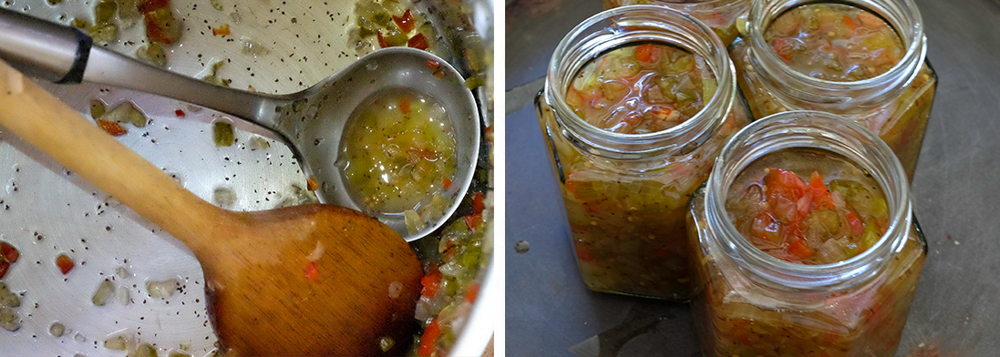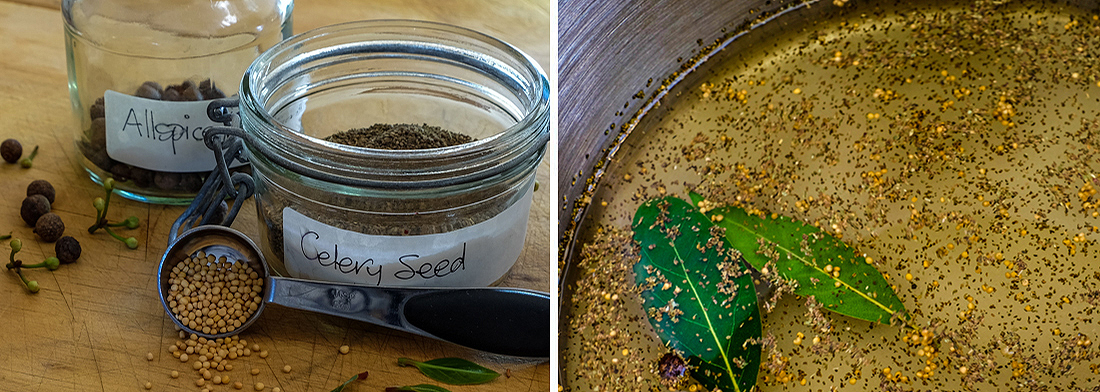Sweet Cucumber Relish

When the pickling cucumbers are running rampant in the kitchen garden, take control and transform the cool green cuc’s into this versatile relish. It teams perfectly with the humble hot dog or hamburger and adds an interesting twist to potato salad and creamy based cheese (fetta, ricotta, cream cheese) and biscuits. For a bit of glam, serve as an accompaniment to freshly shucked oysters. My favourite though is with smoked salmon and sour cream, served on lightly toasted olive sourdough bread and with a generous topping of cucumber relish
- Preparation Time:
- 30 minutes + overnight brining
- Cooking Time:
- 20 minutes
- Quantity:
- 6 x 300 ml jars
INGREDIENTS
- 1 kg
- Pickling cucumbers, seeded, finely chopped
- 2
- Brown onion, peeled, finely chopped
- 6-8
- Celery stalks
- 2
- Red capsicum (pepper), seeded, finely chopped
- 2
- Green capsicum (pepper), seeded, finely chopped
- 3
- Garlic cloves, peeled, finely chopped
- 50g
- Preserving salt
- 1.4 litres
- Apple cider vinegar or white wine vinegar
- 1 tablespoon
- Mustard seeds, whole
- 2 teaspoons
- Celery seeds
- 2
- Allspice berries, whole
- 400g
- White sugar
- 2
- Bay leaves, preferably fresh

METHOD
Place the diced cucumbers, onion, red and green capsicum, celery and garlic in a large mixing bowl. Cover with water, add the salt and stir to dissolve. Cover with a clean tea towel and allow to marinate overnight in the fridge or at least for a minimum of 4 hours. Drain the mixture into a large colander. Rinse thoroughly to remove the salt and allow to drain to remove excess moisture.
Place the sugar, vinegar and spices into a preserving pan and bring to the boil. Turn down and simmer for 5 minutes.
Add the cucumber mixture, return to the heat and simmer, uncovered for approximately 5-8 minutes. Do not over cook as the mixture needs to retain a crunchy texture and the syrup needs to reduce to make a slightly thick consistency. Remove the bay leaves and allspice berries.
Use a funnel to pour into hot dry sterilised screw cap sealable bottles, fill to approximately 2.5cm (1 inch) from the top of the bottle and seal.
Label and store in a cool dark place in the kitchen or pantry.
Allow to mature for at least 2 weeks before eating. Once opened, store in the fridge and use within 1 month.
NOTES
- European cucumbers are also called gerkins. The skins are thin, so they can be used with the skin on as it adds a lively green colour to the pickle, however begin processing within a day or so after picking. Small pickling cucumbers, up to 4 cm, are best preserved as French-style cornichons. When they get larger, this relish is an ideal way to use them up. If they get too large and the skin become tough, peel before proceeding with the recipe.
- If using unpeeled, scrub the cucumbers to remove any garden dirt and debris and only use commercial cucumbers that are unwaxed.
- Spiced vinegar is made by gently simmering the aromatics and vinegar together. It can be made in advance. Strain and store in a cool dark place in the kitchen or pantry. The longer the aromatics are left to steep in the vinegar, the stronger and darker it will become. This may or may not suit our style of pickling For this recipe, the aromatics should not dominate the fresh lively flavour of the cucumbers, capsicum and celery.
- Allspice, also known as Jamaican pepper, clove pepper or pimento, is the dried mature but still green unripe berry of Pimenta dioica. The dried berries retain their flavour well and will keep almost indefinitely if stored in a cool dark place. Ground allspice, however, quickly loses it flavour and should only be purchased in small quantities as small amounts are generally used.
- Bay leaf, also known as sweet bay or bay laurel is the fresh or dried leaves of Laurus nobilis. It adds a resinous, herbal and floral undertone to the vinegar.
- Celery, also known as smallage or wild celery are the seeds of Apium garveolens. They add a slightly bitter, yet savoury and lemony flavour to the vinegar.
- Mustard, also known as Indian mustard, are the green seed fruit from Brassica alba (white), B. juncea (brown), or B.n igra (black) plant. They provide a pungent, earthy, sharp flavour.
- Remove the allspice berries from the pickling vinegar before using, as they can darken the pickle over time and their flavour can become overpowering.
- Cucumbers have high water content. Excess water is removed by soaking the cucumbers in a brine solution overnight. However, to remove the excess salt, the mixture must be drained, thoroughly washed, and allow to drain again to remove any excess water. If this step is eliminated the result will be a watery relish.
- The capsicum adds a colour contrast to the pickle and the celery adds some additional crunch to the final texture.
- Preserving salt not cooking salt? Use pickling salt, not table salt, when making pickles and preserves. Table salt contains stabilisers and anti-caking agents and often iodide which forms a whitish haze and sediment. These additives and in particular iodine can affect the appearance and taste of pickles and preserves during the maturation and storage period. The ingestion of a cocktail of anti-caking chemicals such as calcium silicate, sodium silicoaluminate, tricalcium phosphate, magnesium carbonate, silicon dioxide and yellow prussate of soda, is also unnecessary.
- Is it a chutney or a relish? Chutney is made from chopped fruits and vegetables that are cooked slowly with vinegar and a sweetener – usually sugar and spices to make a thick, savoury jam-like mixture. Chutney’s are best allowed to mature for at least 2 months in a cool dark place before eating. Relishes, are similar, however they are cooked for a shorter period of time. This reduced cooking time produces a lighter, crisper and fresher preserve. The fruits and vegetables are usually finely diced so they are cooked more quickly, hence retaining their crisp texture and a wine vinegar or apple cider vinegar is used which also contributes to a lighter fresher taste. Typically relishes also contain less vinegar and sugar which means they can’t be kept as long.
